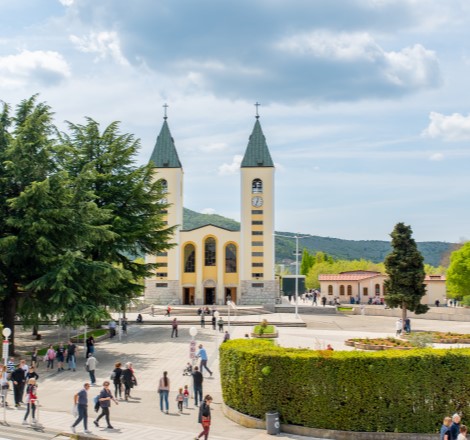

Years of existence
Population size
The oldest written mention of the name Brotnjo, or today’s Municipality of Čitluk, dates back to May 24, 1306, in an act by a Dubrovnik duke, preserved in the Historical Archives in Dubrovnik. Even in the Middle Ages, Brotnjo was connected by roads, including Roman ones. The name is believed to derive from the plant Broć (Rubia tinctorum), which was used in medieval times to dye fabric in this area. This plant, characteristic of the Brotnjo region, is featured on the coat of arms of the Municipality of Čitluk, which also includes a cross symbolizing the people’s devotion to Catholicism. The Čitluk flag is gold colored, representing the high-quality Žilavka wine, or the “gold of Herzegovina,” tobacco. It was designed by Dubrovnik artist Luka Peko. The town of Čitluk began to develop as the administrative center of Brotnjo in the late 1950s. Today, it is a hub for education, economy, transport, sports, culture, and tourism.
Brotnjo is a fertile karst plateau in southwestern Bosnia and Herzegovina, at an elevation ranging from 22 to 582 meters above sea level. It includes the Municipality of Čitluk and parts of Ljubuški (Lipno settlement), Čapljina (Šurmanci settlement), and Mostar (Slipčići settlement).
Among Brotnjo's numerous archaeological sites, the medieval cemetery of the Komlinović family at the Visočica site stands out. It is located in the central part of the Broćan field in Veliki Ograđenik.
The Municipality of Čitluk boasts the largest vineyard area in Bosnia and Herzegovina. Nearly every family owns a vineyard and wine, reflecting a strong tradition linking people with grapevines.
Gradnići Parish: Today a small parish in Brotnjo, once vast in both area and population. Gradnići is the mother parish of all other parishes in Brotnjo. The Parish of Gradnići is the oldest parish in Brotnjo and one of the oldest parishes in Herzegovina.
Čerin Parish: is the seat of Western Brotnjo and the parish center of Čerin, which has about 4,800 inhabitants. This place was once the seat of the municipality, but later the municipal seat was moved to Čitluk.
Krstivode, on the hill above Dobro Selo, is known as one of the oldest pilgrimage sites in Herzegovina, dating back to 1308. The name Krstivoda itself is unique. More commonly, one might encounter names like Krstina or Krstine, Crkvina or Crkvine, but Krstivoda is singular. And this alone speaks to the uniqueness of this place and its significance.
The latest posts related to events, culture, winemaking, local stories, sports, and everything important from the heart of Brotnjo.